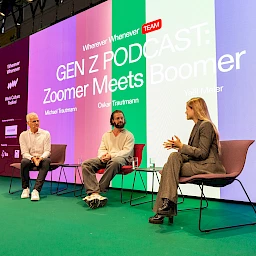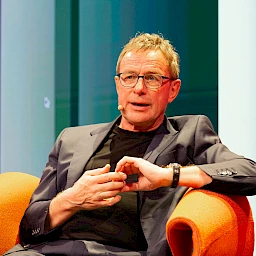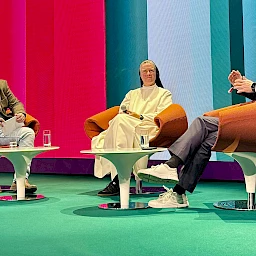Today, leadership is no longer a question of job title, but of attitude. In a rapidly changing world of work shaped by technological developments, social changes and new employee expectations, traditional management skills are no longer enough. Real leadership is needed, characterised by clarity, a willingness to engage in dialogue and the courage to share responsibility.
What constitutes leadership today was discussed intensively at the Work Culture Festival 2024. The contributions by Yaël Meier, Nicole Langosch, Frauke von Polier and Ralf Rangnick show that good leadership starts where people listen, work together and don’t take themselves too seriously. It’s less a question of “what” than of “how”. How do people communicate? How are employees integrated? How do you deal with conflicts, mistakes and uncertainty? The following is an attempt at classification.
Generations in dialogue — cooperation instead of conflict
The live podcast “Zoomer Meets Boomer” made it clear that good collaboration is a question of attitude, not age. Gen Z brings new perspectives, a matter-of-fact attitude to the digital world and a strong sense of purpose. It demands not only to be heard but also to have a real say. The older generation brings experience, structure and vision. If both sides are willing to learn from each other, this creates real added value for companies. The prerequisites for this are dialogue on an equal footing, mutual respect and a management culture that not only allows diversity, but specifically promotes it.
Leadership means listening, not making pronouncements
Nicole Langosch, Germany’s first female cruise-ship captain, describes her leadership role as one that relies on trust, teamwork and clear communication. She knows that better decisions are made when different perspectives are taken into account. Her credo: “Leadership is responsibility, but never going it alone.” How this translates to the world of work is clear: if you want to lead teams in complex situations, you need an open feedback culture, structured decision-making processes and psychological safety. Employees need to know: My opinion is welcome, my criticism is appreciated. This is the only way to come up with creative solutions and sustainable decisions.
Leadership through attitude and development
Football coach Ralf Rangnick also emphasised in his keynote speech that good leadership has less to do with authority and more to do with development and a genuine interest in developing people. That means recognising potentials and supporting them over the long term while upholding clear values. Success arises not from short-term decisions but from the sustained maintenance of relationships and the right attitude. Responsibility for personnel also means creating the right conditions in which talent can unfold. In everyday life, this means listening, accompanying and also making consistent decisions when necessary. Today, this mixture of clarity and development is the focus of many organisations, and not just in the field of sport.
Psychological safety as a driver of innovation
Michael Trautmann, co-founder of the podcast “On the Way to New Work”, points to Google’s “Project Aristotle”. This sees psychological safety as the key success factor for functioning teams. Those who can address their own ideas, doubts or mistakes without fear work better, more creatively and with more commitment. Managers play a pivotal role here — they should not only offer feedback but also actively create an environment in which trust can develop. This also involves sharing your own insecurities and encouraging others to take on responsibility.
The trophy office: the office as a cultural resonance chamber
Physical space also plays a role. Yaël Meier describes her “trophy office” not as a place of control but as an expression of pride, cohesion and identity. “People are proud to have an office. Not because they have to, but because they want to,” she says. The physical office thus becomes a cultural anchor. It creates space for encounters, informal discussions and a sense of togetherness that digital formats find difficult to generate. Rooms that feel like a second home, café corners for spontaneous ideas, places of concentration and connection. The office as a resonance chamber for corporate culture.
Leadership as co-creation: empowerment instead of instruction
Frauke von Polier puts it in a nutshell: “Leadership is a process, not a state.” Leaders today need to be reflective, authentic and adaptable. Leadership means delegating responsibility and not just bearing it. Younger generations in particular don’t want to just work, they want to help shape. In other words, they’re looking for genuine participation, clear values and transparent communication. Don’t talk about young employees, talk to them. Delegating responsibility, even when it’s uncomfortable to do so. Diversity in a team should be understood as normal, not as a special case. At the same time, von Polier emphasises that modern leadership always means working on yourself. Self-management, the willingness to develop further and emotional intelligence become key competencies. In a world where change is part of everyday life, we need managers who provide assurance through their attitude, not through their status. That’s because teams are orientated towards people, not positions. So it’s all the more important for a manager to remain approachable and willing to learn.
Leading with purpose and responsibility
The discussion between Peter Tauber, former State Secretary, and Sister Ursula offered a special change of perspective. Both emphasised that leadership is not just organisation, but always also service to people, characterised by attitude, humility and responsibility. Especially in uncertain times, it is important to provide guidance, even if you don’t know all the answers. Creating a sense of purpose is not a bonus, but a key management tool, according to her message. This also means taking a step back, listening and taking other people seriously, regardless of function or hierarchy. For Sister Ursula, leadership is also inextricably linked with care. Whoever leads, accompanies. Whoever accompanies, contributes. This attitude can also be transferred to economic contexts, for example in the healthcare sector, educational institutions or social welfare organisations. But it also provides impetus for the economy. When companies put people and relationships at the centre, more resilient, more sustainable structures are created.
What does this mean for companies? In every case, a redefinition of the term leadership as empowerment, not as control. As building relationships, not giving instructions. This presupposes that trust is not presumed, but created. Through clarity, listening and genuine interest in people. And through spaces, both physical and interpersonal, in which diversity becomes a resource. Whether Boomers or Zoomers, whether at the desk or on a ship: good leadership begins with the courage not to know everything, but to mutually broaden one’s perceptions. Or as Yaël Meier puts it: “Do it!”




 Jasmin Najiyya
Jasmin Najiyya 


